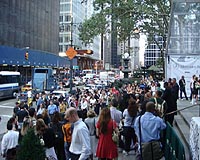| . |  |
. |
Washington (AFP) Nov 18, 2009 World Bank chief Robert Zoellick said Wednesday it was critical for indigenous people to be included in climate change talks, saying they were among groups most affected by global warming. Two weeks before the opening of a major United Nations conference on climate change in Copenhagen, Zoellick said indigenous peoples carried a "disproportionate share of the burden of climate change effects." He spoke at a Washington roundtable that brought together native and tribal group representatives from around the world as well as non-governmental organizations, the private sector and other groups for climate change talks. They were aimed at helping to set up a so-called Indigenous Peoples Climate Action Fund to provide direct financing to selected indigenous communities around the world. The fund will be used to, among other objectives, strengthen the capacity of indigenous peoples' communities to influence decision-making and to engage in dialogue on climate change at the national and international level. "Climate change exacerbates the difficulties that indigenous communities already face -- including loss of land and resources, lower human development indicators, discrimination, unemployment, and economic and political marginalization," Zoellick lamented. With their long experience in managing natural resources and adapting to climate change, he said the native and tribal groups could "also add to our knowledge and understanding of how best to cope with this complex challenge." Zoellick cited several examples of how, in different parts of the world, the knowledge and experience of indigenous peoples was helping them cope with some of the already inevitable impacts of climate change. In parts of Africa, he said, indigenous peoples had long made use of the dry land conditions -- by growing Red bush tea, for instance. In the Marshall Islands, they have found ways to use blocks of coral to protect fresh water supplies from salt water contamination, while in Vietnam they plant dense mangroves along the shores to protect the coastline, he said. In Australia, Zoellick said, aboriginal communities were using traditional controlled burning to keep the undergrowth under control, helping to prevent giant fires that devastate entire landscapes and released massive amounts of carbon into the atmosphere. Some 192 countries attending crunch UN climate talks in Copenhagen next month are set to push for a political deal to prepare the way for a binding pact next year to follow on from the Kyoto Protocol, which expires in 2012. Share This Article With Planet Earth
Related Links Climate Science News - Modeling, Mitigation Adaptation
 Tackling population rise would fight climate change: UN report
Tackling population rise would fight climate change: UN reportParis (AFP) Nov 18, 2009 Braking the rise in Earth's population would be a major help in the fight against global warming, according to an unprecedented UN report published Wednesday that draws a link between demographic pressure and climate change. "Slower population growth... would help build social resilience to climate change's impacts and would contribute to a reduction of greenhouse-gas emissions in the future ... read more |
|
| The content herein, unless otherwise known to be public domain, are Copyright 1995-2009 - SpaceDaily. AFP and UPI Wire Stories are copyright Agence France-Presse and United Press International. ESA Portal Reports are copyright European Space Agency. All NASA sourced material is public domain. Additional copyrights may apply in whole or part to other bona fide parties. Advertising does not imply endorsement,agreement or approval of any opinions, statements or information provided by SpaceDaily on any Web page published or hosted by SpaceDaily. Privacy Statement |